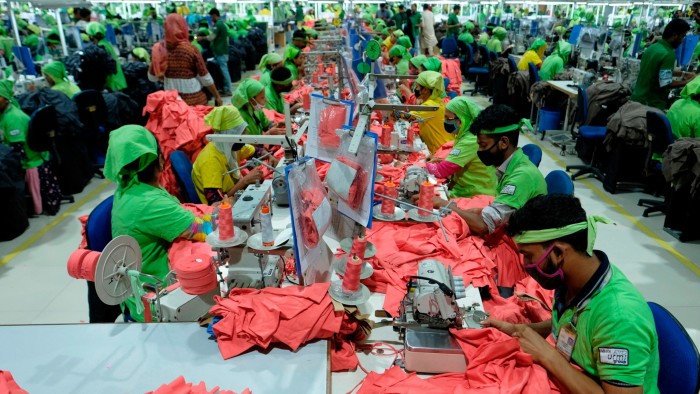Unlock the Editor’s Digest for free
Roula Khalaf, Editor of the FT, selects her favourite stories in this weekly newsletter.
Bangladesh is hoping a pledge to buy more US cotton will help persuade President Donald Trump not to maintain a 37 per cent tariff on its exports that threatens its vital garment sector.
“Bangladesh will take all necessary actions to fully support your trade agenda,” interim leader Muhammad Yunus promised Trump in a letter published this week that also vowed Bangladeshi tariff cuts on US products such as gas turbines, semiconductors and medical equipment.
The 84-year-old Nobel Peace Prize laureate’s offer comes amid concern in Dhaka that Trump’s tariffs could unravel an industry that subsists on low margins but generates four-fifths of Bangladesh’s export earnings.
Economists have also praised the industry’s role in lifting millions of women out of poverty. But they have long warned of the country’s over-reliance on a single-industry “monoculture”.
The tariff threat to the garment industry adds to the worries of Yunus’s interim administration as it tries to revive Bangladesh’s economy, reform state institutions and mend ties with India, which supported former authoritarian leader Sheikh Hasina, who was overthrown last year.
In his letter to Trump, Yunus asked for a three-month grace period on the tariffs to allow his government to “substantially increase US exports to Bangladesh”.
Alongside an offer to “significantly increase” imports of wheat, corn and soyabeans, he said Bangladesh would streamline customs procedures and build dedicated duty-free bonded warehouses for cotton “to improve speed to market”.
The White House did not immediately reply to a request for comment.
According to the US Department of Agriculture, Bangladesh was the world’s second-largest cotton importer in the year 2023-24, trailing China, and is projected to be the largest in 2024-25 with imports of 8mn bales. West Africa was Bangladesh’s largest source of cotton, making up 35 per cent of its imports in 2023-24, followed by India and Brazil. The US accounted for 11 per cent of its imports.
Bangladesh garment sector officials said imported US cotton was priced competitively relative to that of other suppliers — including product brought by road from India. However, they said setting up warehouses where cotton could be stocked and delivered on a shorter lead time would allow Bangladesh to buy more, easing the pressure from Washington over the US trade deficit.
Clothing manufacturers in Bangladesh that supply US companies warn that if the tariffs are maintained, they will lose business to rival countries that were promised lower tariff rates on what Trump dubbed “liberation day”.
“Jordan, Egypt and Kenya will be the biggest winners,” said Miran Ali, a member of the support committee of the Bangladesh Garment Manufacturers and Exporters Association. “These are the only countries with any garment sectors worth speaking of which are not subject to massively increased tariffs, and which will now benefit.”
Egypt and Jordan were subjected to relatively low 10 per cent and 20 per cent tariffs respectively, in last week’s announcement by the US administration. Kenya — with a 10 per cent tariff — is among the countries that benefit from the African Growth and Opportunity Act, a long-standing US trade scheme that gave eligible countries duty-free market access.
The terms of trade had “now changed dramatically”, Ali said.
“Brands are going to want to share the costs with us,” said Mahir Ahmed, director of Apex Holdings, a clothing producer whose buyers include Target, Walmart and Gap. “For a country investing in sustainability, this development feels like a curveball that could affect everything from cost structures to international competitiveness.”
A second industry executive, who asked not to be named because of the sensitivity of the matter, said: “We have been hearing of order placements being deferred, and we anticipate big challenges with pricing structures due to the tariffs.”
The bulk of Bangladesh’s clothing exports goes to US “big box” mass market retailers such as JCPenney, Target and Walmart, and manufacturers said they expected that business to be harder hit than orders from premium brands such as Ralph Lauren or Tommy Hilfiger.
“The impact will be on the US customer,” said Vidiya Amrit Khan, deputy managing director of Desh Garments, which lists US retailers Macy’s and Target among its customers. “Will they be willing to pay more?”
The US tariff threat is the latest setback for the industry after the Covid-19 pandemic and the political and labour unrest that accompanied the overthrow of Hasina, which caused some foreign buyers to divert business.
Manufacturers had also been preparing for Bangladesh’s expected “graduation” from UN Least Developed Country status next year, which will mean the loss of trade preferences it enjoys from some European and other nations.
The country’s producers have spent heavily on improving their safety, environmental and other credentials since a 2012 fire at a garment factory near Dhaka that killed at least 112 people and put a spotlight on sustainability.
“We invested in these initiatives to make Bangladesh a sustainable destination for US brands in particular,” said Apex Holdings’ Ahmed. “But the tariffs are undermining all these investments.”
Additional reporting by James Politi in Washington and Susannah Savage in London. Data visualisation by Jonathan Vincent, Alan Smith and Ryan Joseph Ramos
This story has been amended to reflect the fact that Bangladesh is on track to overtake China to become the world’s largest cotton importer in 2024-25





